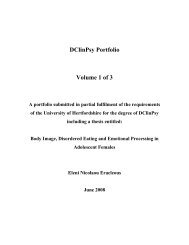PhD thesis - University of Hertfordshire Research Archive
PhD thesis - University of Hertfordshire Research Archive
PhD thesis - University of Hertfordshire Research Archive
You also want an ePaper? Increase the reach of your titles
YUMPU automatically turns print PDFs into web optimized ePapers that Google loves.
they would for other bacterial gastrointestinal pathogens (Rooney et al.,<br />
2000).<br />
4.2 Case-control studies<br />
Case-control studies are observational studies used frequently in infectious<br />
disease epidemiology. They are relatively simple to plan and execute, and<br />
are particularly useful for rare diseases or those where other epidemiological<br />
approaches would be prohibitively expensive (e.g. cohort studies) or<br />
unethical (e.g. randomised control trials to investigate the potentially toxic<br />
effects <strong>of</strong> chemicals). Fundamental to the case-control study is the<br />
establishment <strong>of</strong> an outcome <strong>of</strong> interest (e.g. confirmed infection, hospital<br />
admission, death etc) which distinguishes „cases‟ from „controls‟ within a<br />
particular study population. Exposure information leading up to this outcome<br />
is then sought (either retrospectively or prospectively) for both cases and<br />
controls and appropriate statistical comparisons <strong>of</strong> these data are undertaken<br />
to identify factors particular to cases i.e. „risk factors‟ for the outcome <strong>of</strong><br />
interest.<br />
Case-control studies are, however, subject to a number <strong>of</strong> biases which limit<br />
their effectiveness and have the potential to distort their findings. Firstly,<br />
because they are identified through surveillance, cases usually include<br />
laboratory-confirmed infections who are selected non-randomly. Infants,<br />
children and people with more severe/prolonged disease are more likely to<br />
present to and be seen by a primary care physician, and they may be more<br />
likely to submit a sample for laboratory testing. Furthermore, laboratory-<br />
confirmed cases might be more willing to participate in a study depending on<br />
their exposures, outcomes or both. For example, patients who experienced a<br />
more severe illness might be more inclined to participate in a study than<br />
patients with milder infections, or they might be more assiduous in their<br />
responses to study questions. Alternatively, patients who believe that they<br />
contracted their illness at a restaurant might be more willing to participate if<br />
they think that it might facilitate compensation claims against the<br />
24

















